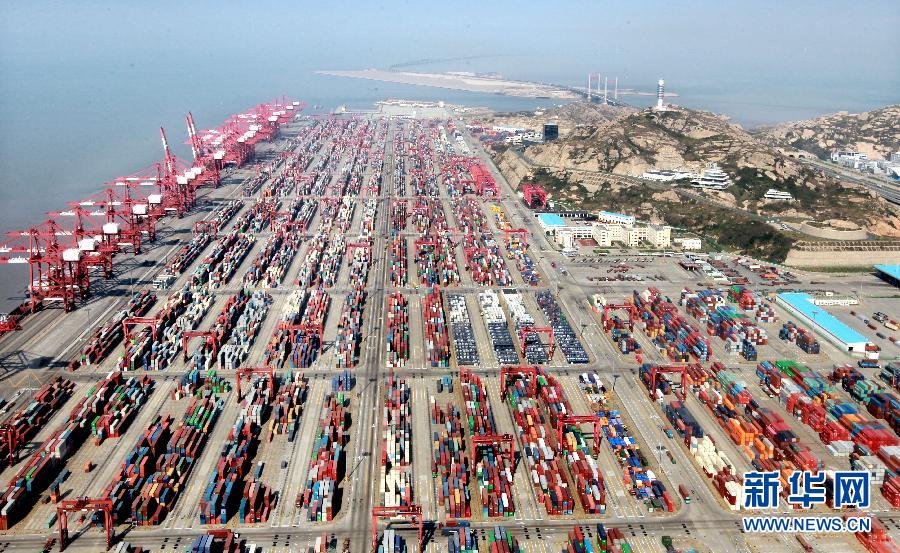


China has set a goal of building itself into a global powerhouse in international trade by 2035 through further reform and fine-tuning of trade structure, including upgrading the quality of goods and services consumed in the local market and improving the quality of two-way investment, the country's commerce minister said on Monday.
To reach the long-term target, the Ministry of Commerce first has to further enhance China's role as a major global trading partner before 2020 and deploy more resources to maintain a steady growth in international trade, make efficient use of foreign investment and ensure Chinese companies invest overseas in an orderly way in 2018, according to Minister Zhong Shan.
"Next year, China will continue to deepen the cooperation and partnership with economies related to the Belt and Road Initiative and host an international imports exhibition to further boost trade and stimulate investment," Zhong said.
The ministry's other priorities in the next five years include further tapping regional trade growth engines, fostering new trade momentum in high-end products and services, and building up new bilateral and multilateral free trade protocols, he said.
Meeting the moderate goal of being a major trade player by 2020 would demonstrate that China is sufficiently strong in many elements of global trading, but there is still some way to go for China to grow into a truly global trading powerhouse. Problems and challenges it may still face include things like labor costs, environmental issues, lack of core technology and trade protectionism, said Ma Yu, a senior researcher at the Chinese Academy of International Trade and Economic Cooperation.
A country that is a global trade powerhouse needs to have many world-leading industries and a favorable investment and trading environment, with the support of preferential government policies, an advanced logistics network and sound infrastructure, Ma said.
"Also the country has to be a firm proponent of multilateral economic cooperation and trading systems," he said.
Ren Hongbin, director-general of the ministry's Department of Foreign Trade, said even though China is still confronting trade issues such as protectionism and outdated technologies in certain sectors, its perspective for next year will be promising, thanks to the recovering global economy and tangible results generated by supply-side structural reform.
As the major driver and stabilizer of the global economy, China will push forward a new pattern of all-around opening-up to pursue mutual benefit with the rest of the world, according to a statement released after the Central Economic Work Conference concluded on Wednesday.
The country will increase imports and cut import tariffs on some products to promote balanced trade, it said.
China's foreign trade volume rose to 25.14 trillion yuan ($3.8 trillion) between January and November, which is a 15.6 percent increase in comparison with the same period the previous year, the General Administration of Customs said.
Eager to diversify its earning ability, China will push forward a pre-establishment national treatment system as well as a negative list that determine where foreign participation is prohibited or limited. The negative list will become shorter and the country will improve laws and regulations, officials said.

 Award-winning photos show poverty reduction achievements in NE China's Jilin province
Award-winning photos show poverty reduction achievements in NE China's Jilin province People dance to greet advent of New Year in Ameiqituo Town, Guizhou
People dance to greet advent of New Year in Ameiqituo Town, Guizhou Fire brigade in Shanghai holds group wedding
Fire brigade in Shanghai holds group wedding Tourists enjoy ice sculptures in Datan Town, north China
Tourists enjoy ice sculptures in Datan Town, north China Sunset scenery of Dayan Pagoda in Xi'an
Sunset scenery of Dayan Pagoda in Xi'an Tourists have fun at scenic spot in Nanlong Town, NW China
Tourists have fun at scenic spot in Nanlong Town, NW China Harbin attracts tourists by making best use of ice in winter
Harbin attracts tourists by making best use of ice in winter In pics: FIS Alpine Ski Women's World Cup Slalom
In pics: FIS Alpine Ski Women's World Cup Slalom Black-necked cranes rest at reservoir in Lhunzhub County, Lhasa
Black-necked cranes rest at reservoir in Lhunzhub County, Lhasa China's FAST telescope will be available to foreign scientists in April
China's FAST telescope will be available to foreign scientists in April